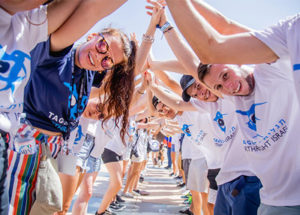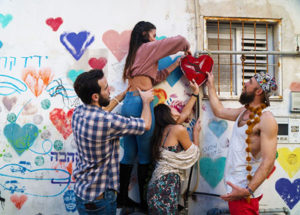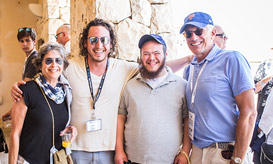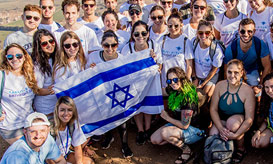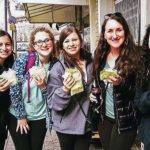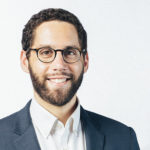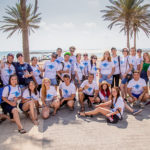It has always been my dream to visit Israel. And when my parents decided they would…
The idea of going on Birthright Israel had been in my head long before I turned 18, but it always seemed like a hypothetical, not something I would actually do. This was due mostly in part to my upbringing in a town of very few Jewish people. No one talked about going to Israel and I couldn’t name a single person who had taken the trip through Birthright Israel. When I was in college, I finally had a friend who went but it still seemed like something unattainable, for no other reason than because I had decided it was.
It started to feel more attainable as I spent my junior year of college living abroad in Florence and Israel stopped feeling like this far off world, only a few hours flight away from Italy. After graduation I moved to Australia alone, overshooting Israel by quite a distance, but becoming secure in my ability as a solo traveler, to make friends as I went, and to feel comfortable in a surrounding unlike what I’d known.
Whenever I thought about going to Israel, I pictured going over the winter months. It seemed like an amazing way to escape the cold of New York while avoiding a hot Israeli summer. When I returned from Australia in December 2018, it was too late to go on the trip that season, meaning I would have to wait a year. As 2019 went by, the idea stayed in the back of my mind. Then, as life tends to do, I got busy and forgot to apply when the application opened. It wasn’t until the first week of November that I finally sent in my information to Birthright Israel, hopeful that there was still room for me. But, when I checked I was met with a notice that the trip I wanted to attend was full and all other people would be waitlisted. I was disappointed in myself for waiting so long to apply and sad that it looked like my trip would have to wait another year.
Well, as fate would have it, the very next day I was notified that someone had dropped out and a spot was available for me on the trip. I was especially excited as the dates coincided with Hanukkah. I couldn’t believe that, after all the times the idea had come to mind, I would finally be heading to Israel in just over a month.
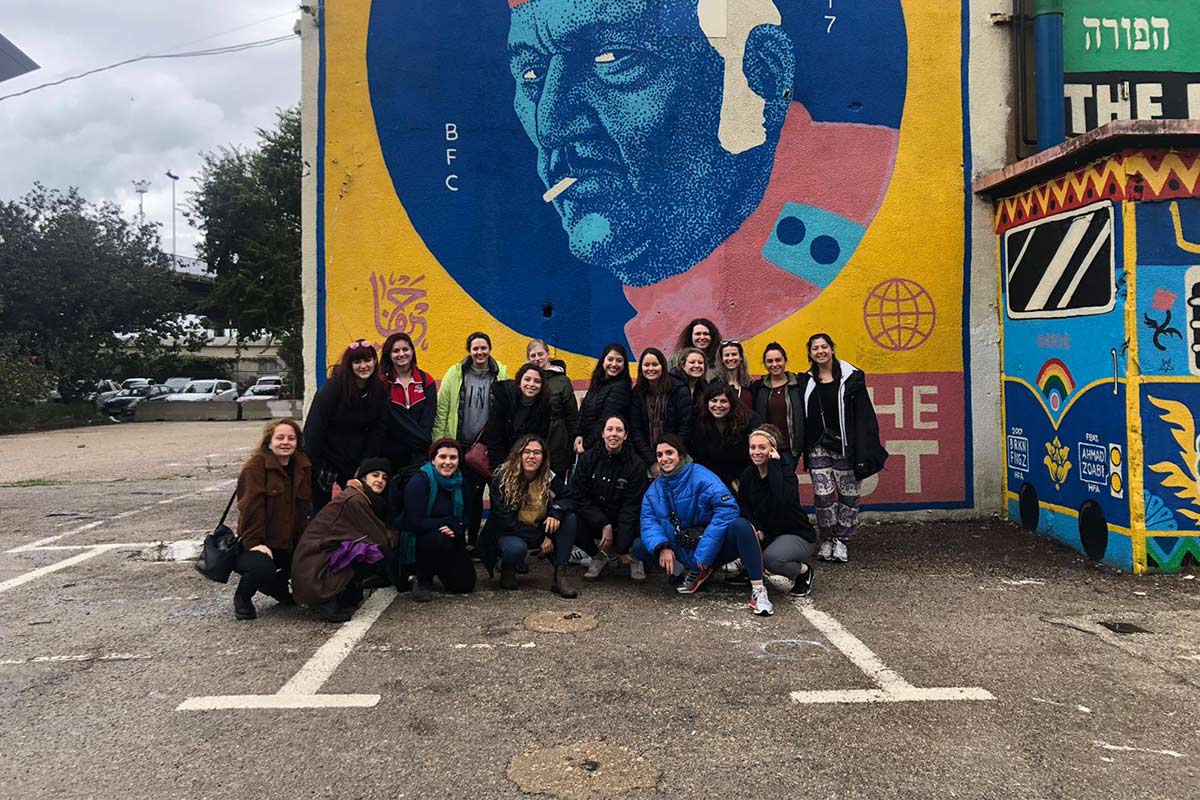
While incredibly excited to finally be going to Israel, I was also really nervous about what people would think about my relationship to Judaism. I hadn’t been to temple in years, I was never bat mitzvahed, and there were quite a few holes in my knowledge about Judaism as a whole. What if everyone else was this fully formed Jew while I stumbled aimlessly around, sticking out for my lack of background?
As the trip approached, I often found myself hoping that I would get the answer to the question which had long stuck with me: Was I considered a real Jew without a strong connection to the religion? I didn’t know if culture and heritage were enough to give me a place in the community or if I would forever feel like an imposter.
As with most fears that we dwell on, I found that mine had been unnecessary. Through open discussions with my peers, facilitated by our wonderful guide Ori, I learned about all the different ways a person can be Jewish. While a majority of the people on my trip had a bar or bat mitzvah and could speak a little bit of Hebrew, I was shocked to discover that most of them were at the same place as I was in relation to Judaism. The more I talked to them one on one or in these group conversations, I saw that they too had often felt like outsiders—too Jewish in some situations and not Jewish enough to feel like they necessarily belonged in the community.
This was the first time in my life I spent a large amount of time in a group solely made up of other Jewish people and I was shocked to discover how special it felt to be a part of. I was so used to feeling like an outsider with few people taking the time to understand my background. Instead, here I was surrounded by people who had the same culture and background as me, also looking to learn more about it and connect to others.
Before attending Birthright Israel I was unaware that a big part of the experience is having the Mifgashim, a group of Israelis join the trip, providing the opportunity to learn from each other. At first, when Ori mentioned it, I thought this was a rare occurrence and was, once again, wary that I would be judged for being less Jewish than they may expect.
This was made even more remarkable once the group of Israelis joined us. When we first met, I found myself once again feeling fear that I would be judged for the way I practiced my Judaism.
Instead, I found that most of them were also more culturally Jewish than religious. In a Jewish state, I assumed that most people would be tied closely to the religion. Yet, just like me, many of them were focused more on what it meant to be a Jew culturally versus needing to prove themselves through religious pursuits. This was unbelievably comforting to hear.
“My discussions with the Israelis reinforced what I had learned in past travels: Without speaking to the people who call a place home, it is impossible to have any chance of understanding what it is really like.”
Their presence became the most impactful aspect of the trip in more ways than one. Honestly, before I went on Birthright Israel I had allowed the news provided about Israel to cloud my impressions and it made me believe that people were more likely to leave it than have a desire to stay. My discussions with the Israelis reinforced what I had learned in past travels: Without speaking to the people who call a place home, it is impossible to have any chance of understanding what it is really like. The Israelis I met came from all over the country and each had the most beautiful reasons for why they are proud to call Israel home and, for most of them, why they don’t plan to leave.
One of the Israelis, Lior, facilitated the most memorable moment of my trip. On the day we explored the Old City of Jerusalem rain poured down on us with the wind was right beside it, taking out our umbrellas. I knew we were making our way closer to the Western Wall and felt frustrated by weather, as well as nervous about how to act during such a key experience.
As we approached the viewpoint to see the Western Wall for the first time, the sky cleared as if to say, this is important we’ll give you space. Lior took my hand, guiding me up the stairs to the balcony overlooking the wall, ensuring I didn’t see it until it was directly in front of me. I slowly took it all in, watching from above as people slowly made their way, taking their time with the tradition.
After entering the enclosed area in which the wall is approachable, I found myself unsure of what to do. Lior was once again there to help me, explaining that there was no right or wrong thing to put in my note and then writing my name in Hebrew on its folded edge. I will never forget the care she gave me during this experience as I mimicked the movements of so many other Jewish people who had come before us. She held onto me as we made our way towards it, the wall appearing mightier with every step closer. When we arrived, she found a spot for me right where the sun’s beams hit the stone surface and stepped away to give me time to appreciate the moment’s gravity. Once finished, she grabbed my arm again, aiding me as I walked backwards, still facing the Western Wall, captivated by all the stories it had heard and all the stories that would come.
Through each discussion, each site I saw, and each interaction I witnessed during my time on Birthright Israel, I now know that no matter how religious I choose to be, it has no impact on my Jewish identity. I am Jewish because I was born so and can finally accept that to be true. Before my imposter syndrome was so strong I almost hesitated to tell people I was Jewish and now I feel proud to easily say it.
This trip taught me that there is no one size fits all, no perfect way to be Jewish. It’s so much more about who you are than what you do with it. To be Jewish is to be part of a community of people who accept you for who you are, breathing in the shared stories that define who you are, and together choosing where the culture will continue next.

